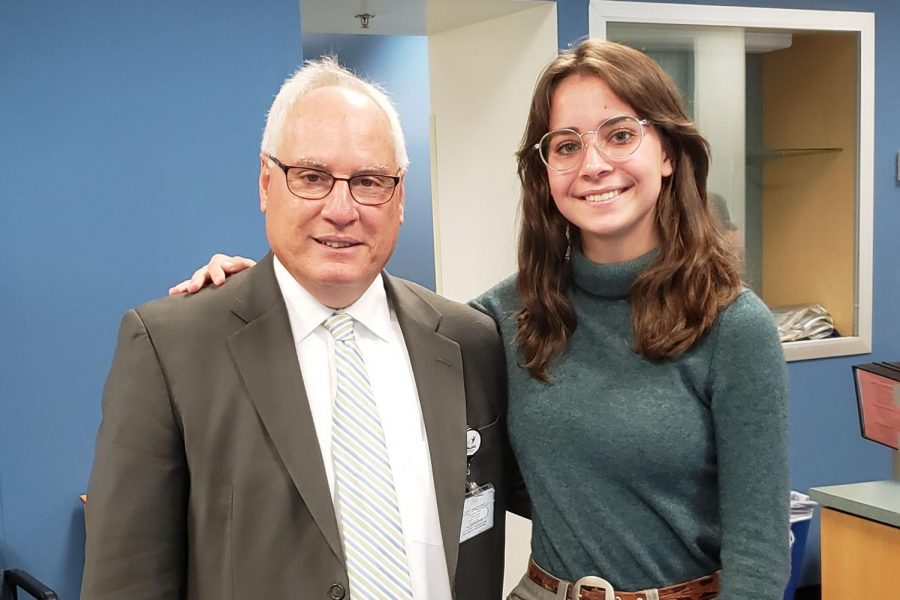In Communication: Getting to Know Scott Kizner, Stafford County’s New Superintendent
October 24, 2018
“I don’t like to overpromise and underdeliver.”
These words have a history of empty promises- the phrase “actions speak louder than words” is the embodiment of that. However, when new Stafford County Superintendent Scott Kizner says that he doesn’t like to overpromise and underdeliver, he means it.
Kizner has served as superintendent for Virginia counties Harrisonburg and Martinsville as well as Westerly, Rhode Island. All of those positions, even Harrisonburg (where he served the longest but had two years remaining on his contract) were rewarding and educational for Kizner, which raises the question‒ Why did he leave Harrisonburg and move to Stafford?
“I ask myself that question every day,” Kizner said while laughing. He was looking for a new professional challenge that was close to where his daughters lived, and Stafford met those requirements. “I’ve always left a place I really loved, which makes it harder. I chose Stafford because it has a rich tradition of academic excellence, during my interview I met a lot of people and I saw people had great words to say about the school system and I just felt like this was the right place at the right time,” said Kizner
The policies he is considering for Stafford, as well as his comments on previous policies and events relevant to Stafford, show that he is quickly catching up to the county’s needs. Of course, only time will tell, however, the SCPS policy changes and system developments that are in the works bode well for the future.
Although Kizner doesn’t have direct goals for this coming year, he does have what he calls a “one-hundred-day plan”.
“My first 100 days are meeting with different stakeholders throughout the community; for example, I’m meeting with each board of supervisors individually, school board members, different parent groups, different parent leaders, different community leaders; I’m visiting every school (I’ve gotten to twenty-six of our thirty-one schools; I have five more schools to go) for round one,” said Kizner.
In terms of policy, not much can be expected for the short term; Kizner must get to know the citizens of Stafford before he can make the choices that will best benefit them. However, in the long term, much can be anticipated. By the end of the 2018-2019 school year, elementary schools will have new zoning to maximize the effectiveness of the system. A new elementary school is also in the works.
A major complaint of the students and parents of Stafford has been the lack of proper high school zoning. The current zoning is ineffective as some schools have overpopulation when the schools that some students should, based on geographical proximity, be zoned to are not overcrowded to the extent of other schools. To fix this, the plans for a new high school are being developed. Although it will be built by the mid-2020s, it’s existence is almost definite
For the county, policy development and adaptation for the next few years are still in the works, which is why Kizner’s first 100 days will consist of communication. He recognises that change will be hard to come by if the people he works for (the students and parents of Stafford) don’t know or trust him. Thus, a major part of his platform has been not just communication as previously mentioned, but morale.
“When the days are sometimes long and stressful, I go on my own twitter account and then I go back weeks, maybe months, sometimes years and look at a picture. And then I can almost (and almost every time) remember going into that classroom and remember a student or remember a teacher. So, it’s for me to celebrate the school system with others, but also to remind me why I even chose this profession and specifically, this job,” said Kizner.
An interesting fact about Kizner is his educational history. Despite the fact that most people who are considered successful tend to preach that Business and/or Economic Studies is the basis for every profession and life overall, Kizner disagrees. His degrees include a Bachelor of Arts degree, two master’s degrees in the Arts and Education Specialty, and a doctorate degree in Philosophy as well as post-doctoral requirements for Educational Leadership. “It’s interesting- when I started undergraduate school I was actually an Economics major and then I became a Psychology major. Humanities is a foundation I feel that applies to almost every profession and what you do in your personal and professional life,” said Kizner.
According to Kizner, the degree in School Psychology has had the biggest impact on his life. He acknowledges that school systems are rarely accommodating to their students’ needs, and he believes that this degree helps him understand and fix the flawed system.
Through the process of working in school psychology, Kizner gained the appreciation of working with struggling students- those who are disadvantaged by circumstances outside of their control.
“The only change we could do is change ourselves, and that’s the system,” said Kizner.


